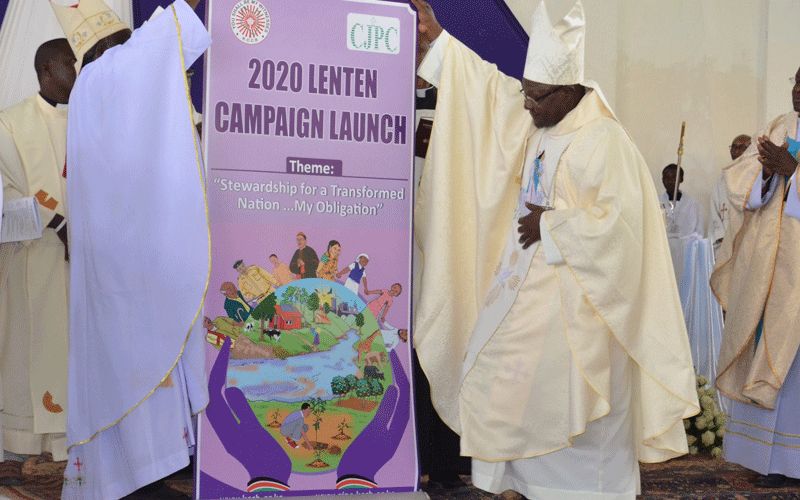Other challenges that the Church leaders pointed out include increasing joblessness and frustrations of young graduates, massive land conflicts and a decline of morals in the society.
“The land conflict experienced in parts of the country, the high rise of unemployed graduates, the clamor for the referendum to amend the constitution, the collapse of some key sectors such as the sugarcane, tea and coffee industries that smallholder farmers depend on for their livelihoods are among other indicators that show that all is not well,” the Bishops asserted.
Speaking to ACI Africa on the sidelines of the Saturday event in which Kenya’s President Uhuru Kenyatta participated, Archbishop Martin Kivuva of Mombasa said the Bishops’ Pastoral Letter was meant for all people of good will, regardless of their religious affiliation.
“This letter isn’t just meant for Catholics alone but it should be read and understood by everybody. In Mombasa, we are distributing it to anybody who cares to read it,” Archbishop Kivuva said.
According to the Mombasa Archbishop who doubles up as the Catholic Justice and Peace Commission (CJPC) Vice Chairperson within KCCB, the Pastoral Letter would serve as an extension to the 2020 Lenten campaign.
(Story continues below)
“Every year when we mark the Lenten campaign, many people forget about the season’s reflections at the end of the five weeks. But now, the Pastoral Letter will give them something to continue building discussions about even after the Lenten season is over,” the Archbishop said.
The Pastoral Letter organized in five thematic of Peace, Justice, Truth, Mercy, and Hope is to be reflected upon in the framework of See, Judge and Act, according to the Kenyan Archbishop.
“People will be presented with a story, which they will reflect upon as they try to localize it in their day to day experiences. The action they decide to take will also be at a local level,” explained Archbishop Kivuva.
Meanwhile, in his homily at the Saturday well-attended event, the CJPC official urged Christians to adhere to the promises made during that launch of the anti-graft war last October.
“It is a time for us to remind ourselves of the promises we made during the launch of the fight against corruption. Each one of us needs to stand up and be counted in this war,” Archbishop Kivuva said at the Saturday event attended by representatives of the Catholic members of Parliament among other top government leaders.
Highlighting the five thematic areas of the Lenten period that kicks off on Ash Wednesday, February 26, Archbishop Kivuva said Christians would forge impactful discussions on responsible and sustainable farming, youth and development, management of natural resources, leadership and accountability and sanctity of life and human dignity.
And explaining the importance to address farming issues in Kenya, the Archbishop of Mombasa said, “As the church, we recognize the importance of farming and resulting issues of food security. We also note that irresponsible farming practices such as irresponsible use of farm chemicals poses health risks to consumers. These are issues that we shall be talking about in the first week of the Lenten campaign.”
The event that was presided over by KCCB Chairman, Archbishop Philip Anyolo of Kisumu Archdiocese brought together five Bishops from Archdioceses of Kisumu, the Archdiocese of Mombasa, Ngong’ Diocese, Embu Diocese and the Catholic Diocese of Nakuru.
Bishop John Oballa of Ngong Diocese, on the other hand, urged all Kenyans to be good stewards of all that God had put under our responsibility.
"On (judgement) day, God will ask each one of us to give an account of what we did as stewards. We must defend and protect the family, which is the cradle for human civilization and the domestic Church,” Bishop Oballa who serves as Vice Chairman of KCCB said.
“We must reject all non-life-giving practices that are being introduced to our children including certain gender ideologies and Comprehensive Sexuality Education,” Bishop Oballa who is also the Chairman of Catholic Justice & Peace Commission of KCCB said.
On his part, Kenya’s President Kenyatta, a Catholic faithful, expressed his support for the Bishops’ move to fight against corruption and called upon all Kenyans to play their role in the fight against the vice.
“Every one of us has a responsibility to ensure we combat corruption; we protect our environment and we work together to ensure there is peace. If each and every one of us play their roles effectively, I don’t see the reason why we cannot tackle the challenges facing us,” President Kenyatta said.
The country’s President warned against blaming each other in the face of adversities saying, “Our problem is pointing fingers when a problem arises. Today, I have learnt that it is important to each look at ourselves and to change.”
The President further urged Kenyans to live peacefully, especially in Nakuru that has been hit by extreme violence in the past, saying, “Nakuru is the meeting point of people from all parts of the country. I see no need to shed each other’s blood because of politics.”
“Your ethnicity will not improve your living standards but vision and good policies will. And that vision can come from any Kenyan in any part of the country. If we are guided by good policies, I have no doubt that there will be peace and Kenyans will not live with the fear witnessed every election cycle,” the President said, urging Catholics to spread the gospel of peace and anti-corruption during this year’s Lenten season.
Agnes Aineah is a Kenyan journalist with a background in digital and newspaper reporting. She holds a Master of Arts in Digital Journalism from the Aga Khan University, Graduate School of Media and Communications and a Bachelor's Degree in Linguistics, Media and Communications from Kenya's Moi University. Agnes currently serves as a journalist for ACI Africa.








